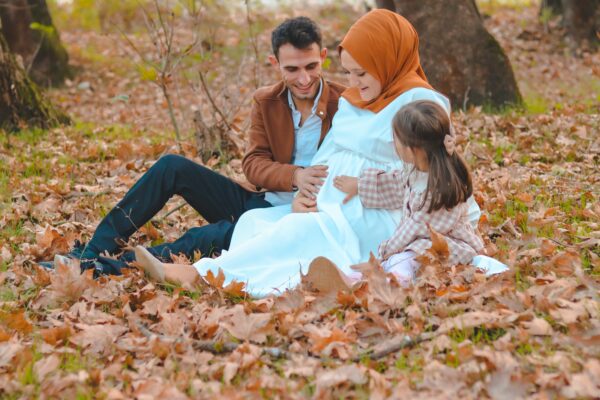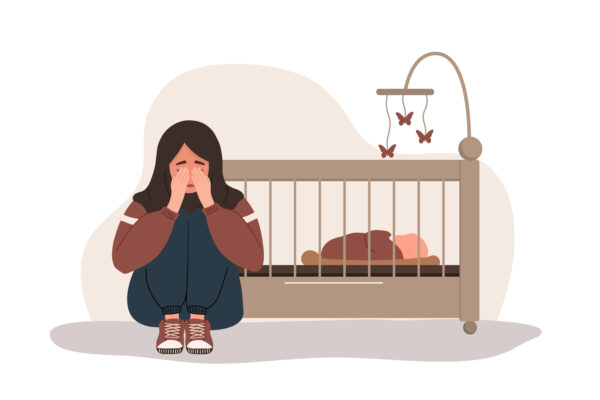I now see that when my children’s hearts are turning away from Allah, my role as a mother is to help them find their way back to Him.
I now see that when my children’s hearts are turning away from Allah, my role as a mother is to help them find their way back to Him.
“Have you been a naughty girl?”, the nurse said to my daughter as she spilled her cup of water on the hospital floor.
My 2-year old looked down in shame; even at that age, I could see that she understood the word ‘naughty’ as she shrunk from her bright, vibrant self, inwards. I felt compelled to say something.
“Thank you for your help. In our home, we prefer not to use the word ‘naughty’. She was just experimenting with the water and that’s how it spilled. We prefer to look beyond the behaviour to understand the child.”
At that point, I could see her glaring at me as if I was a hippy mum and was probably thinking — ‘yeah right, that one is going to run rings around you!’ Now that I am expecting my fifth child, mashAllah, I was not fazed by such judgmental looks. In fact, I know that I am doing the right thing for my child and I am 100% confident in how I want to raise my children.
But how did I reach this confident state?

To be honest, I actually parented my first three children very differently. My priority back then was to make them independent very quickly, to be ahead of their peers academically, to keep them to a very strict routine and to be super-productive with their time. But guess what? That didn’t get me anywhere! Well, it got me somewhere, but not where I wanted to be.
My children were a nightmare to put to sleep; pleading with me not to leave their room at night. Even if I gave them their ‘5 minutes’ of quality time, they still made a thousand excuses to come down and kept waking up in the night looking for me. They were so clingy that I became so resentful of their need for me because by now, I just wanted some ‘me time’.
They hated the strict after-school study routine that I had set for them. It required so much coaxing for them to just sit and do it so that they could then go and play. Even as we did it, I would end up shouting at them for not focusing and trying hard enough. Eventually, they become really nervous when I would check their work because when I would find ‘silly and unacceptable errors’, I would tell them off again! If we were not studying after school, we were heading off from one club to another and I’d end up sitting in the car for hours waiting for them to finish. Then I’d rush home to cook and bathe them and get them in bed for the magic 7.30pm deadline which I was so strict with. It honestly seemed that the world would come to an end if I was even one minute late.
That’s what I saw back then, but here’s what I didn’t see at the time:
My children just wanted to be children, not robots forced to grow up before their time. The Islamic guidance of play with your children until the age of 7 and teach them from 7 was a very strange concept to me back then. My idea of being a parent was only to be a teacher to them and prepare them for life ahead. My focus was so much on the future that I was missing the opportunity to enjoy them in the here and now.
When I decided to finally apply the guidance and let them play, it felt like such a waste of time to me. But instinctively, I knew I had to push through and trust in our guidance. I read ahadith about how the Prophet Muhammad, peace be upon him, allowed his grandchildren to climb his back in salah and did not reprimand them. When my children did the same, I was furious with them for disturbing me in salah and I would be thinking as I prayed, ‘just wait until I finish.’
I wanted so badly to be a good Muslim parent. I was so desperate for it… but how did I come so far away from the sunnah? Why was I always so angry and disappointed with my children when they would not behave in the way I wanted them to?
The answer came in one simple word: mindset. Once I experienced this mindset shift, it changed the way I saw my children forever.
I realised that the key to changing our parenting was to change our mindset. What we think of our children and ourselves, ultimately defines how we treat them. So, when I reflected on how I viewed my children, it hit me like a ton of bricks because I was not seeing my children as children. I was seeing them as products of me who had to become the best version of mankind, and they had to do it quickly. There was no time to be a child; their training had to start early and it had to equip them for the harsh realities of life; and even worse, I saw their behaviour as a reflection of me. If they were not behaving as they ‘should’, it meant that I was a bad parent. That’s when my harsh, controlling, and disciplinarian style of parenting developed. This approach led my children to become very demotivated and have low self-confidence and low self-esteem because they simply could not reach the high standard I had set for them.
I had missed the whole point of parenting and this was certainly not the approach to parenting that the Prophet, peace be upon him, adopted. He was very gentle, compassionate, patient, and understanding towards children. The key to raising your children in accordance with the sunnah of parenting is to understand the mindset behind it – that is to see your children for who they really are: children. To realise that their behaviour is not a reflection of you nor is it a reflection of how ‘naughty’ they are; it reflects the state of their heart at that moment.

Remember the hadith that says:
“There is a piece of flesh in the body and if it is good, the whole body is good and if it is corrupted, the whole body is corrupted and surely that is the heart”.
To apply this to our children. We must look past their behaviour and understand what is corrupting their behaviour at that moment, and that is the state of their hearts. You see, it is within the spiritual heart where our thoughts and feelings come from and how we think and feel affects the state of our heart. The key question is to ask: what is happening in our children’s thoughts and feelings that is corrupting their behaviour?
Our child’s behaviour is simply a reflection of how confused their thinking is when deciding what the best thing to do is in their particular situation. It’s that simple!
When it comes to our children acting out, most of the time we believe it to be deliberate. But this is not the case. No one really sins or commits a wrong on purpose. Just think back to the last sin you committed, did you do it because you wanted to sin or because you felt you had no choice, or that the end justified the means? We convince ourselves that we have no choice, right? We lose sight of the right thing for a moment and convince ourselves that wrong can be right in this situation. This is the power of thought; we could be living in a garden and believe it to be a cage, or we could be living in a cage and believe it to be a garden. The power of our thinking can be so convincing that it can lead us to lose sight of reality.
We are told to make a thousand excuses for our brother, but how often do we make excuses for our children? We are quick to see them as ‘naughty’ on purpose. But if we didn’t do it on purpose, then why do we think they did it on purpose? Alhamdullilah, my relationship with my children transformed when I started to give them the benefit of the doubt and help them work through their confused thinking.
For example, I noticed that my eldest child started to pick on her brothers, criticizing them and telling tales on them. When I dug more deeply with her, it turns out she was feeling left out because the boys played together more and she thought they no longer wanted her around. As we discussed it, she saw that she wasn’t being as open as they were when it came to playing games. She kept wanting to choose the games they played. So they stopped playing with her. Once she realised this, she became more open to playing and the three of them were happily playing together. She thought that she was unwanted and because of that, she felt justified in being rude to the boys, in an attempt to get them to notice her again. This confused way of thinking is what was behind her ‘naughty’ behaviour. Understanding our children at this level allows us to really help them get to the root of the problem.
As parents, we often make the mistake of thinking that we must somehow give them all of the knowledge they will ever need. However, Allah has created them to instinctively discover most of this for themselves through playing and exploring.
Similarly, parents may mistakenly think, like I did, that we must make our children independent, when the nature of babies is to be dependent. By the very wisdom of how they were created, Allah (swt) made them dependent upon us so that we may develop that bond, mercy, and patience with them. These are key qualities necessary for the whole journey of parenting.
With all of these realisations, I now see my children very differently and as a result, they are thriving, happy and growing into wonderful human beings, full of love, compassion and wisdom. They are independently keen to study for school and practise their religion. May Allah (swt) preserve them and protect them and all our children. Ameen.
I tell you honestly that this transformation came from me changing myself first and foremost because Allah (swt) tells us that ‘indeed, Allah will not change the condition of a people until they change what is in themselves’.
If you are worried that your parenting style is not how it should be, but you are stuck not knowing how to turn things around, I can be contacted at connect@aminahossen.com or you can access my free parenting webinar here.





